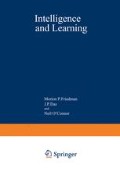Abstract
Analyses of the information-processing mechanisms underlying performance on verbal tasks have been relatively unsuccessful in identifying the components responsible for individual differences. A review of pertinent studies supports the notion that performance on practiced skills is more likely to be correlated with scores on psychometric tests of verbal ability than are performance measures obtained on new skills. With practice, skills become less attention-demanding and more “automatic.” Such overlearned skills are not likely to be affected by transient situational variables but rather to reflect the limits of an organism’s abilities.
Access this chapter
Tax calculation will be finalised at checkout
Purchases are for personal use only
Preview
Unable to display preview. Download preview PDF.
References
Chiang, A. and Atkinson, R. C. Individual differences in interrelationships among a select set of cognitive skills. Memory and Cognition, 1976, 4, 661–672.
Cohen, G. Hemispheric differences in serial vs. parallel processing. Journal of Experimental Psychology, 1973, 97, 349–356.
Cohen, R. L. and Sandburg, T. Relationship between intelligence and short-term memory. Cognitive Psychology, 1977, 9, 534–554.
Fleishman, E. A. The prediction of total task performance from prior practice on task components. Human Factors, 1965, 7, 81–127.
Goldberg, R. A., Schwartz, S. and Stewart, M. Individual differences in cognitive processes. Journal of Educational Psychology, 1977, 69, 9–14.
Hogaboam, T. W. and Pellegrino, J. W. Hunting for individual enees in cognitive processes: Verbal ability and semantic processing of pictures and words. Memory and Cognition, 1978, 6, 189–193.
Hoving, K. L., Morin, R. E. and Konick, D. S. Recognition reaction time and size of memory set: A developmental study. Psychonomic Science, 1970, 21, 247–248.
Hunt, E. Mechanics of verbal ability. Psychological Review, 1978, 85, 109–130.
Hunt, E., Frost, N., and Lunneborg, C. Individual differences in cognition: A new approach to intelligence. In G. Bower (Ed.), Advances in learning and motivation (Vol.7). New York: Academic Press, 1973.
Hunt, E. and Love, L. T. How good can memory be? In A. Melton and E. Martin (Eds.), Coding processes in human memory. Washington, D. C.: Winston-Wiley, 1972.
Hunt, E., Lunneborg, C., and Lewis, J. What does it mean to be high verbal? Cognitive Psychology, 1975, 7, 194–221.
Keating, D. P., and Bobbitt, B. L. Individual and developmental differences in cognitive processing components of mental ability. Child Development, 1978, 49, 155–167.
Lyon, D. R. Individual differences in immediate serial recall: A matter of mnemonics? Cognitive Psychology, 1977, 9, 403–411.
Martin, M. Memory span as a measure of individual differences in capacity. Memory and Cognition, 1978, 6, 194–198.
Posner, M. I., Boies, S. J., Eichelman, W. H., and Taylor, R. L. Retention of physical and name codes of single letters. Journal of Experimental Psychology: Monograph, 1969, 79 (1, part 2).
Schneider, W., and Shiffrin, R. M. Controlled and automatic human information processing: I. Detection, search and attention. Psychological Review, 1977, 84, 1–66.
Schwartz, S., and Wiedel, T. C. Individual differences in cognition: Relationship between verbal ability and memory for order. Intelligence, 1978, 2, 353–369.
Sternberg, R. J. Intelligence, Tnformation processing and analogical reasoning: The componential analysis of human abilities. Hillsdale, NJ: LEA, 1977.
Sternberg, S. Memory scanning: New findings and current controversies. Quarterly Journal of Experimental Psychology, 1975, 27, 1–32.
Author information
Authors and Affiliations
Editor information
Editors and Affiliations
Rights and permissions
Copyright information
© 1981 Plenum Press, New York
About this chapter
Cite this chapter
Schwartz, S. (1981). Verbal Ability, Attention and Automaticity. In: Friedman, M.P., Das, J.P., O’Connor, N. (eds) Intelligence and Learning. NATO Conference Series, vol 14. Springer, Boston, MA. https://doi.org/10.1007/978-1-4684-1083-9_53
Download citation
DOI: https://doi.org/10.1007/978-1-4684-1083-9_53
Publisher Name: Springer, Boston, MA
Print ISBN: 978-1-4684-1085-3
Online ISBN: 978-1-4684-1083-9
eBook Packages: Springer Book Archive

